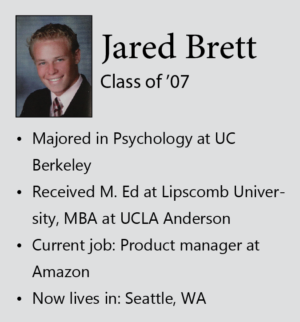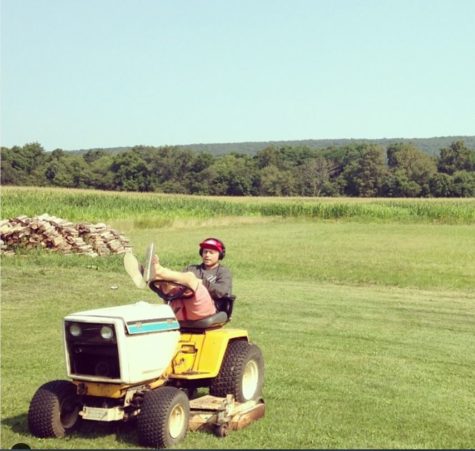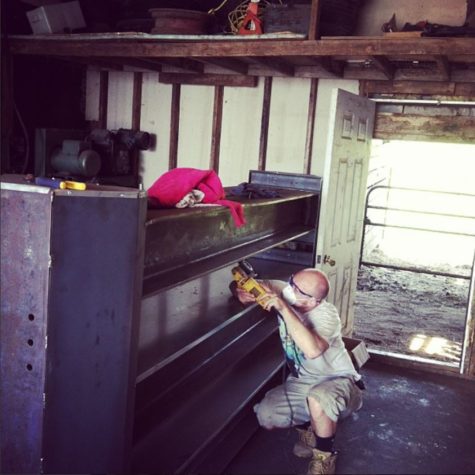Brett maximizes life experiences
December 17, 2021

When he was at Westview, Jared Brett spent his time playing lacrosse, acting in the Westview Theater Company, and writing for The Nexus. Even as a high school student, he demonstrated his varied interests and talents, many of which proved to only show themselves more as he entered the workforce after college. Since graduating from UC Berkeley in 2011 with a degree in Psychology, Brett has taught for Teach for America, earned a Fulbright scholarship for teaching in Indonesia, founded a snowboarding company, acted as an industrial supply manager, and now works as a product manager at Amazon.
Although Brett’s path has been nonlinear, as a high-schooler, he planned for a much more straightforward journey. He said that at the time he was pretty confident that he would either become a doctor or a lawyer. However, it didn’t take long for Brett to learn that law was not the path for him. As for medical school, Brett said he was interested in pursuing a medical career up until his junior year of college when he was pushed towards psychology after an introduction to business class he took and a psychology class that was being taught by one of his favorite biology professors.
“Surprisingly, it wasn’t in my first psychology class, but rather a business class that pushed me into psychology,” Brett said. “In an [introductory business class], the professor touched on the Efficient Market Hypothesis. I found it hard to buy the idea that all economic actors are rational. This led me down the path of Behavioral Economics, which turns out to just be Social Psychology with limited scope. I learned about topics like recency bias, the halo effect, and confirmation bias, and found them fascinating.”
Inspired by what he was able to learn in this class and by one of his favorite professors teaching a psychology class, Brett was then motivated to take a class directly targeted at psychology to get a more in-depth understanding.
“[In that first psychology class] I realized just how cool psychology was,” he said. “[It was when] I realized I’m not entirely sure if I want to do this medical school thing. It was in my junior year when I admitted I’m going to be a psychologist.”
After his first positive experience with psychology, Brett had planned to attend graduate school with the hopes of earning a Ph.D. and becoming a psychologist. Before this happened though, he sat down with one of his psychology professors to ask for a letter of recommendation. It was then that Brett received some of the best advice he ever got.
“She told me ‘I will absolutely write your recommendation for grad school. In fact, I would love for you to come work for me and be one of my Ph.D. students,’” Brett said. “But she also said, ‘I’m 45, I have an 18-month-old child, and I have only ever done psychology. I did exactly what you’re proposing to do and I am going to do this, at the very least, for the next 20 years until I’m 65. If you know that that’s what you want to do for sure, that’s great. I did that. But my advice would be to go do something else first.’”
And that’s exactly what Brett did. After college graduation, Brett signed up for Teach for America. Following the advice of his psychology professor, he looked for something that would open doors, and Teach for America was perfect for his goals. It was a well-known organization and was also known to be difficult to get into. The nonprofit organization recruits people to teach in low-income communities for two years.
“My thought process was that if I get into this thing, then I’m going to be appealing to lots of potential future employers,” Brett said. “[Teach for America] was also a time-bound commitment. It was two years, so I thought after two years of doing this, I will come back to grad school if I want to. My two criteria were whether or not this commitment would open more doors for me and is this time-bound so that I’m not looking at myself 15 years from now [regretting my decisions.] I wanted opportunities, and I wanted flexibility.”

While with Teach for America, Brett ended up teaching fifth and sixth grades for two years in Nashville, Tennessee. Since this was his first experience as a working adult, Brett learned a lot and was met with many challenges.
“The transition to being a teacher from being a student was really hard,” Brett said. “All of a sudden my priorities started changing really quickly. When you’re a student, what is good is getting good grades and that’s pretty easy to do. When you become a working professional, no one grades you on anything. You also can’t always be successful just by working hard. As a teacher, I had 90 students and there was no amount of hours I could put in to guarantee that every single student was going to succeed.”
Brett explained that coming from Westview and entering a college like UC Berkeley meant that he always had a way to measure his success in predefined goals. Now, however, without a real way to measure his successes, his role as a teacher was difficult. He had to learn how to fail and how to be comfortable with embracing his failures.
“There was an ugly period towards the end of my teaching career where I became very forlorn and distressed,” Brett said. “I lost all confidence in myself in my abilities because I attributed a lot of my self-worth to achieving predefined goals like getting good grades or getting into good programs. Being a teacher and really truly failing at something for the first time was a huge blow to my concept of myself.”
According to Brett, Teach For America encourages people to hold themselves accountable for their student success.
“It is an effective method, but I found it hard to figure out where to draw the line,” he said. “I taught 90 students and set ambitious goals for how much they would grow and develop throughout the year, two-year increases in math and science based on standardized tests in a single school year. If any of my kids weren’t making progress towards that goal, I blamed myself. If only I had spent more time planning lessons. If only I had held more after school tutoring sessions. If only I had made a better connection with their family members. I burned out.”
According to Brett, this first real experience with failure put him at a loss. He spent time re-evaluating what was important to him. In the end, he realized he either had to accept his flaws or think of himself as worthless. Brett said that it took getting to that very low place in his life to actually begin embracing his mistakes and failures.
“That ultimatum that I gave myself pushed me to come to terms with the fact that I’m a flawed human being,” Brett said. “It helped me to have more of a growth mindset, and I learned that perfection is the enemy of the good and I was able to finally really embrace it. Now, I can go and seek out opportunities where I actually see failure as an option. I realize now that’s actually a really powerful thing because it opens even more doors, which is always my primary goal. I want to be able to open more opportunities and open more doors. Being willing to approach situations where I might fail and being comfortable with that opens far more doors than would otherwise be possible.”
With these lessons he gained from working for Teach for America and with the Masters degree he earned in Education, Brett was able to move on and continue to maximize the opportunities he had. The first step he took after Teach for America was to apply to be a Fulbright Scholar. Fulbright is a program that aims to improve intercultural relations and knowledge through exchange programs targeted towards scholars, teachers, scientists, and other professionals.
“I had no idea if I would get the Fulbright or not,” Brett said. “For most of my life I’ve underestimated myself. I didn’t think I was smart enough to go to Berkeley. I thought I must have snuck my way into Teach for America. Fulbright seemed like a long-shot. I applied to all anyway. Fulbright application was fairly straightforward, input background information, upload a resume, respond to a few writing prompts, and get a few letters of recommendation. “
As a Fulbright Scholar, Brett left America for Indonesia to teach English and to teach others how to teach English to others. According to Brett, his philosophy of doing things in order to open more doors was proven with this experience.
“Teach for America was something that I needed to do,” Brett said. “There was no way I would have been able to do this in Indonesia had I not done Teach for America or received a Master’s in education.”
Brett chose to become a Fulbright Scholar for many of the same reasons that he chose to become a teacher with Teach for America.
The prestige of being a Fulbright Scholar, he figured, would help him appeal to future employers, all while not trapping him in any specific profession. But just like Teach for America, teaching for Fulbright in Indonesia also came with lessons and challenges.
The most important lessons came from the cultural differences between Indonesia and America.
Brett summarized the impact of this cultural divide in a blog post titled Culture Shock is a Picnic Idea. In this piece, Brett described his experience attempting to have a picnic for himself in this completely foreign environment.
“It was my third or fourth week in Indonesia and I was just feeling a little alone,” Brett said. “I wasn’t good at the language and I was struggling a bit. I decided that I’m going to go have a picnic. I went to the store to buy the things I needed, but I couldn’t find any [bread, deli meats, wine] or any of the things that I had associated with what was a picnic. That’s when it set in that I was in a very different place and I needed to become a different person to thrive.”
As he taught in Indonesia, Brett continued to expand his worldview. He learned about different perspectives than the ones he grew up with in America.
He learned that people in Indonesia are much less stressed and much less concerned with thriving in a capitalistic society.
“I remember showing up to the school to teach my course on a Tuesday,” Brett said. “I showed up in my normal time, I showed up in my normal Tuesday outfit, and there was nobody else there at school. I later learned that school was canceled because a student that graduated the year before was getting married and many students were invited to the wedding. I remember thinking that this is the most bizarre thing in the world. This would have never happened last year when I was teaching in America. I realized that it’s because, culturally, value in Indonesia is placed in appreciating and respecting your fellow human. That is more important than the hour of English lessons that you could be taking. That forced me to reflect on my own life.”
Brett said after that point is when he began to see himself adopt the traits and mindset of those he met in Indonesia.
“I needed to be much less concerned with myself,” Brett said. “In Indonesia, I realized that I didn’t matter. What is important was what I was able to produce for the world, for my community, or for the people around me. For me, it was the natural progression from accepting that failure is good. The Indonesian period of my life was a dissolution of the ego. That was the person I needed to become in Indonesia to thrive.”
Brett said that this mindset is one he still carries with him today. Although he struggles with maintaining it from time to time, now that he is back in America, Brett is able to focus on what he can produce for the team and solve problems collaboratively within the companies he works at.
“Bringing back this experience from Indonesia is something I use in my everyday life as a U.S. employee,” Brett said. “It makes me a better and more impressive employee. I can approach a situation knowing that I’m not doing this because I want to look good or I want the promotion. I don’t care about that. Bringing that alternative perspective that people aren’t used to in the United States is actually a really effective tool [for productivity.]”
Although he enjoyed his time as a Fulbright Scholar, it was a time-bound event. After his year of teaching in Indonesia from 2013 to 2014, he was free to do whatever he wanted and, like every other moment in his life, his main goal was still to open more doors. He came back to America to help his friend, Nick Gilson, create a snowboarding company.

“At the end of my time in Indonesia, Nick sent me a message asking for my help so I came back,” Brett said. “I became a co-founder and in the first few years I was doing a lot for Gilson Snow, the company. I was running our Twitter account, and taking classes to learn how to organize our manufacturing facility. I was doing web design. I was meeting with PR firms. We’re all doing a little bit of everything. We were even living in a little room at the back of the factory [in Pennsylvania].”
According to Brett, creating a start-up was full of uncertainty and ups and downs. He said that he would have never taken the risk of being part of a start up if he had not learned the lessons of embracing failure with Teach for America and Fulbright. After three years with Gilson Snow, Brett left the company because he was still on the path of making the most out of all his opportunities.
“To me, committing to running a snowboarding company for the next 25 years seemed like closing doors,” Brett said. “I didn’t want to do this. I wanted to open more doors, not close them. I decided to leave because the company decided to go with the lifestyle business, which would require me to make that long, potentially 25-year-long, commitment.”
At this point in his career, Brett has achieved what some only dream of accomplishing. However, Brett said that he still felt like he was missing some things.
“While what I have accomplished looks great, I am worried that, in the not too distant future, a corporation will stop considering me for roles because I never actually worked for a traditional U.S.-based corporation,” Brett said. “I was worried at the time that if I didn’t go and get a traditional job, I would close off traditional jobs to myself forever. At that point in time, I realized I needed to go get a normal job.”
With this new motivation to get a traditional job, Brett responded to a company that had reached out to him on LinkedIn. McMaster-Carr, an industrial supply company, contacted him around the same time when he decided to leave Gilson Snow.
“I chose industrial supply because what was most important to me was getting the job in corporate America to show that not only am I smart and capable, but I can also work in a corporate environment,” Brett said. “The actual field didn’t really matter to me. I chose McMaster-Carr because they had great benefits like paying for any school that I wanted.”
He worked at McMaster-Carr in Los Angeles for a year before moving to Chicago to work in the corporate offices. During his time in Los Angeles, Brett was able to earn an MBA from UCLA Anderson School of Management. Working in this 9-to-5 work setting for the five years that he did opened many opportunities for Brett and allowed him to gain some corporate experience that he believed to be necessary.
“There is value to the restrictive structure of a 9-to-5 that I really liked,” Brett said. “I was coming from a startup, where you work all the time. We were literally living in the factory and working all day. When you move to a corporate job, all of a sudden, 5 p.m. hits and you’re done. You can go and do your life and you can have hobbies, so I appreciated that restriction.”
Brett said that McMaster-Carr opened him up to the idea of working in corporate America and it provided him with many positives and opportunities that he is grateful for. For instance, McMaster-Carr started his transition into working with technology more. This allowed him to work for another industrial supply company called Grainger for a year before he left to take on his current position of senior technical project manager at Amazon in 2021.
To this point, Brett has done many things in his career, from being a teacher, to founding a snowboarding company, to working in corporate management, and now to working with technology. None of his jobs look anything like what he originally planned to do. He is not a lawyer, doctor or psychologist. Instead of sticking with a linear career path, Brett chose to live his life with the philosophy of taking advantage of all the opportunities he had and says he has lived a fulfilling life because of it.
By going through life with the goal of maximizing opportunities, he has learned and gained a lot. With each stage of his career, he has learned various invaluable life lessons.
“My lesson in college was that I was not as dumb as I thought I was,” Brett said. “My lesson at Teach for America was to accept and learn from my mistakes. My lesson in Indonesia was that I am that important. My lesson at Gilson Snow in the transition to McMaster-Carr and Grainger was to open doors and be curious. My biggest lesson now has been putting all of the things I have learned from those experiences together.”
Despite all he has learned, Brett said his most important takeaway is to accept his flaws and that he doesn’t always know everything. He said that only by learning from what you have done wrong can you really open more doors for yourself.
“My advice to high school students is to embrace failure,” Brett said. “You should take that class that you don’t think that you’d be good at and embrace the possibility that you might get your first B, or C, or even D. Apply to that school that you don’t think that you’re good enough to get into and that you are avoiding actually applying to because you’re worried you’ll get rejected. Seek out those moments when you don’t want to do something because you don’t want to fail. Do those things.”


